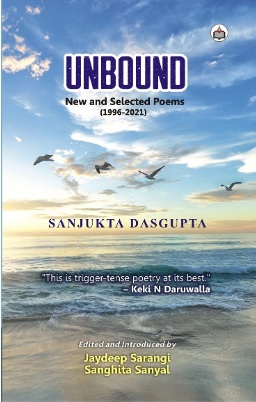A BOOK REVIEW BY S. VINCENT
Unchained
“Man is born free but everywhere is in chains,” said Jean-Jacques Rousseau. Can he be unchained? Can his shackles be ever broken? Replacing the generic ‘man’ with woman can woman ever be unbound? Can she break the glass ceilings? These are the major questions Dr Dasgupta attempts to explore in her collection of poems, Unbound. Numbering 135 poems, written over a period of twenty-five years, this collection spans over a wide range of themes but the core subject is freedom, freedom for women specifically.
The collection has seven sections. The first section has new poems and the others are poems selected from books published in different years. It has obviously a few poems on Covid-19 and its effects. But many others exude hope and confidence in human resilience. Of course the first poem “When winter comes…” does not signify the arrival of spring but it does offer a way of finding solace even in old age. For the poet “compassionate peace is an invincible passionate warrior” and is not everyone in their old age striving for that peace?
Here is a way; be compassionate.
Even Chandalika will be caste-free, flinging “the cast-iron cloak into the free air at last.” A new pristine new year of hope will be born, assures the poet.
Woman’s place in family and society and her rights have been central to the poet’s concern. Patriarchy and male domination are subjected to either ridicule or condemnation. To the readers of Alice Walker or Maya Angelo such themes may appear overworked but when Dasgupta presents them in the Indian context they appear fresh and appealing but sometimes tend to be gruesome too. Take for example the description of the murder of Naina Sahni in 1995. They burnt her: “immolated barbecued, it was a traumatic tandoori night…How many times they ripped your poor remains..” but the poet prays that she should rise and destroy the destroyer.
Characters from Indian myths and puranas come in handy for her satirical outpouring:
She does not want to be Lakshmi:
I can’t be Lakshmi
I can’t be good, sane, silent Lakshmi
I can’t be the Angel in someone’s house
I don’t want to be a disembodied spirit.
In the section from “Sita’s Sisters” there are poems which have references to Ramayana’s Sita.
After all, Sita like every woman was the root of all evil
Whether it was Helen of Troy, Draupadi or Eve
That men can be evil, no one would ever believe
Finally it is Lakshmi who unchains Sita:
Sita stepped out
To step into her own being
Sita felt Lakshmi’s firm clasp
As her chains clattered to the ground!
It is only the characters from Hindu myths that Dasgupta takes for her illustration of women in slavery. Other myths are not left out:
In her kitchen-cum-lab sang Eve, Draupadi, Amina
Songs caged birds sing
….
They praised her as a versatile role model
Daughter, wife, mother or selfless poodle
Petted as lap-cur when feminine
Punished as pariah when feminist.
However, Dasgupta has hopes that women will now itself become victorious in their struggle for freedom. In an unusual poem about our Independence struggle she writes:
Yet the struggle goes on
The freedom fighter
Dries her streaming eyes
Mother and daughter sing aloud –
‘we shall overcome not someday but now’
The flag of International Women’s Independence Day
Flutters with joy
As all chant the freedom song
- ‘not for him or her, but for all or none.’
Themes that have a deep impact on the reader are equally her concern, such as social evils like poverty and caste discrimination. We already made a mention of caste-free Chandalika described in “Elixir of Life”. The same theme is repeated in the poem titled “Chandalika”:
Untouchable
Away, away
Out of sight
Outcast Chandalika
Caste had cast her out!
Dalit dalit
Trampled, tortured, terrified
Some poems which speak about poverty. There is a poem in which an affluent child asks her mother what ‘poor’ means. “Scavenger” describes the man, with a man-sized sack from his shoulder. He and beast are in peaceful co-existence. The irony here is inescapable. Or look at her fifty-year old woman, sitting “huddled under the roadside banyan tree/ Dust, creases and wrinkles on her face” who lived on, incorrigible woman, for a new dawn.
The poet writes on other themes such as rape, violence and environment (see her poem on Chipko). She writes on her reactions to day-today events. She expresses her love for her father, on love, and other mundane things too. She does it with little fanfare, never indulging in complex images or abstract symbolism. In short the collection takes you through a wide range of panoramic views of humanity as she observes it with genuine sincerity.
Dasgupta, Sanjukta. Unbound. New Delhi: Authors Press, 2021.
Pages 249. Price Rs 350.
Also, read a book review of The Runaway Boy written by Manoranjan Byapari, reviewed by Ahana Bhattacharjee, and published in The Antonym:
Follow The Antonym’s Facebook page and Instagram account for more content and exciting updates.



























0 Comments